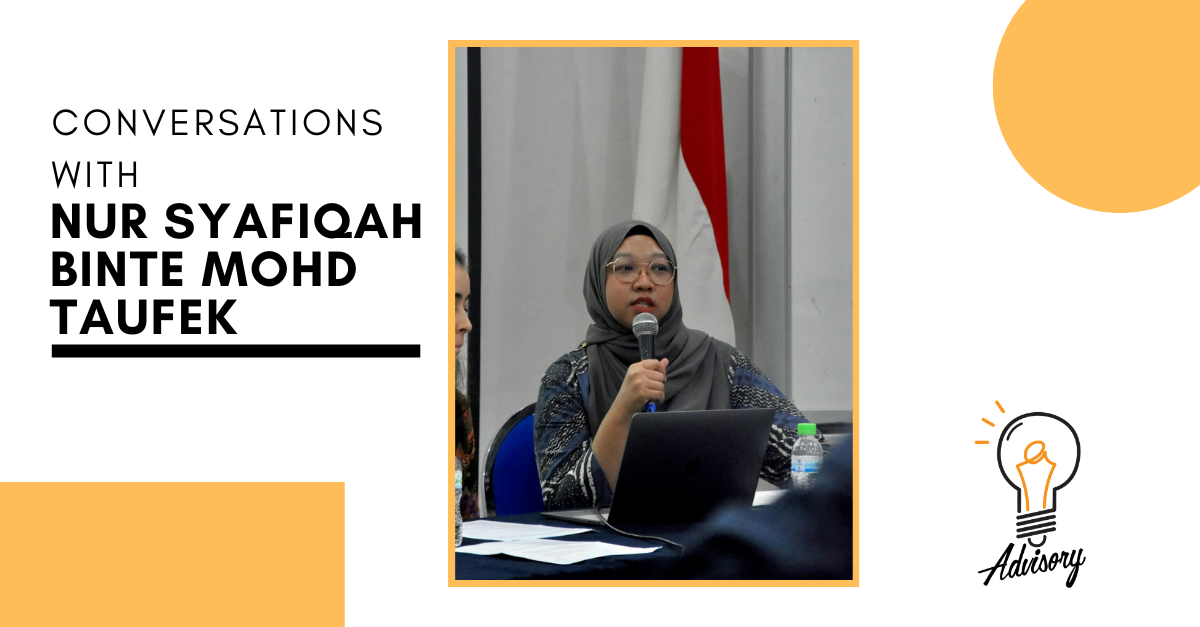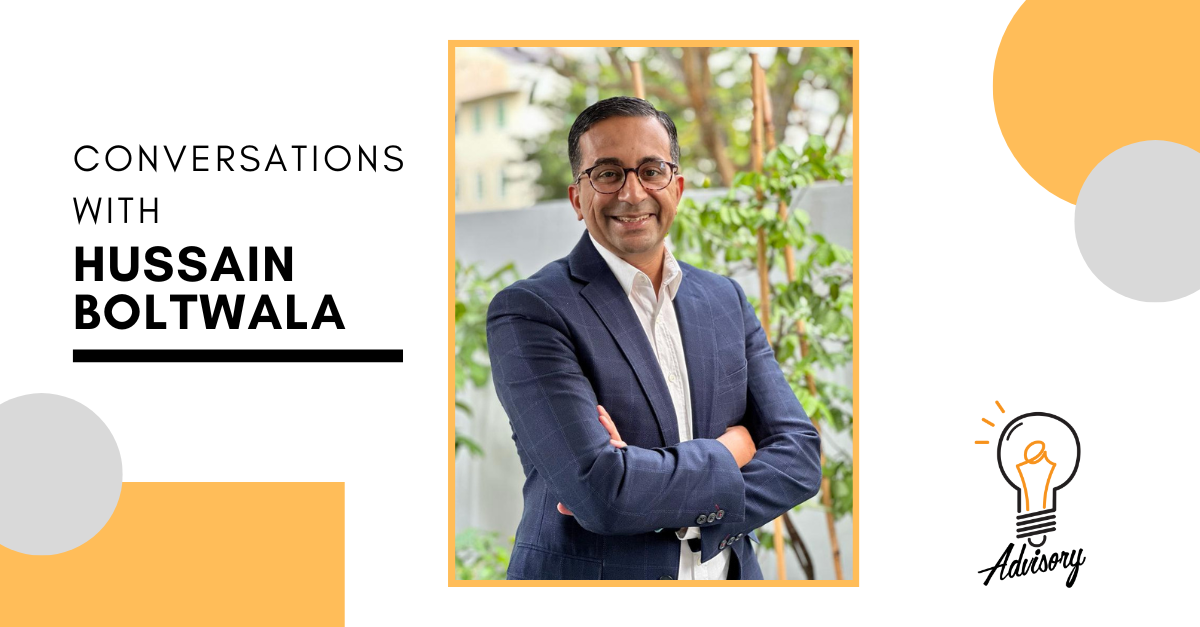Conversations with Nur Syafiqah Binte Mohd Taufek

By Caleb Thien and Kayla Kam
In this article, Syafiqah, a Research Officer at the ISEAS-Yusof Ishak Institute, reflects on her journey in research. She shares her experiences looking into socio-political and economic trends across Southeast Asia.
As a Research Officer at ISEAS-Yusof Ishak Institute, how would you describe a typical workday?
I typically work remotely. I would start my day by catching up on emails. After lunch, I would then begin with the tasks I have set out for the day, be it editing people’s papers or doing my own research. I would then end my day by taking a walk to unwind.
Sometimes, I would change my routine by reading fiction or doing something non-research related in the morning; research is rather cognitively intense after all. Occasionally, I would also take a break from work entirely to brainstorm, allow my mind to wander, and to gain inspiration.
On the days I am scheduled to work in the office, I would start my day earlier and take the opportunity to keep myself informed of the latest research developments by talking to my colleagues.
What does your work entail?
Contrary to popular belief, my job scope as a Research Officer consists of more than research.
Currently, I handle two research projects - one by the Islamic Trendsetters, and the other focusing on youths. Within each project, I perform a managerial role by providing editorial feedback on the papers of visiting research fellows, ensuring that they are acted on accordingly, and sending them off for publication.
Secondly, beyond managing projects, I am also responsible for documenting monthly editorial meetings and producing book reviews for my department’s journal publication. This includes procuring the books, reading them, and submitting my review.
Lastly, I conduct my own research. Although output targets are not set for us, we are encouraged to pursue our own research with the institution’s support. The freedom accorded in this line of work makes our research pursuits rather self-driven.
What attracted you to the field of research?
I have always been loosely interested in research since young, although I was never entirely certain of what it entailed. In university, I discovered that my inclination for problem-solving was what attracted me to research.
After graduating, I interned at ISEAS to experience the life of a researcher. Coincidentally, during my time as an intern at ISEAS, a full-time role related to research on the Islamic Trendsetters - which I had been working on - opened. As this was a topic that I was well-informed about and well-exposed to, I seized the opportunity to remain on the project as a full-time researcher.
What does a career path in research look like?
Depending on whether you pursue a career in research in the public or private sector, you may have to earn a Masters degree or even PhD to contribute meaningfully to the field. At ISEAS, a career typically begins with the Research Officer position. In this role, Research Officers mainly help with a Principal Investigator’s (PI) research rather than leading their own research. Consequently, those with a PhD qualification or extensive work experience would lead research as PIs themselves. Of course, the linear path of career progression varies amongst institutions, some of which do not place as heavy an emphasis on graduate qualifications.
Exit opportunities vary. Some researchers join academia by teaching at universities. Additionally, teaching at polytechnics with a Masters degree is also possible. Others leave research entirely to join the Ministries in Singapore or the corporate sector. Demand from the corporate sector for researchers is usually driven by the desire to understand geopolitics in the region as it relates to their business operations. In some cases, researchers have opted to exit the research sector entirely. Nevertheless, the skills they gain during their time at ISEAS remain useful.
In Singapore, to achieve a tenure, is it more advantageous to gain industry experience or to join academia?
I would not say one is more advantageous than the other. Although having industry experience allows you to gain different perspectives, joining academia is definitely the more linear path, with the added advantage of having experience conducting research on your own.
As long as a keen interest in research is maintained, either pathway may be equally advantageous.
What are common misconceptions about the field of research?
A common misconception about research is that researchers enjoy complete freedom to pursue any topic of interest. In reality, the scope of our work is often shaped by the priorities of the institute we belong to. In my case, all projects should align in some way with Singapore’s context.
Another misconception commonly held is that all research requires a rigorous methodology. While this is certainly the case for academic journals, many of our publications are written for a wider audience. Therefore, they need to be concise, accessible and written in plain language for the general public to understand. Rather than including lengthy literature reviews, we may be required to focus on presenting the key issue, offering perspectives and suggesting solutions.
What are some struggles that researchers face on a day-to-day basis?
There is always a tension between producing something that fulfils key performance indicators (KPIs) and doing research out of professional or intellectual curiosity. Research, by its very nature, is time-consuming. However, in the public service, there is often pressure to work quickly. As such, parts of the process, such as fieldwork, may be shortened or even omitted. At the end of the day, our outputs are read not only by the public, but also by Cabinet Ministers and policy makers.
Furthermore, research rarely moves at a steady pace. A paper may take days, weeks, or even months to complete, depending on the standard expected. In my role, I often review drafts, not only for grammar, but also for content and clarity. I need to add my own inputs as well, to ensure the work meets expectations.
As such, the process of research can take a toll on one’s mental health; I have even had dreams about projects I was working on. Since then, I have learnt the importance of taking breaks. Rest is not just necessary for our well-being, it is also what allows us to produce good work in the long run.
What are some skills you would deem necessary for your line of work?
Firstly, interpersonal skills are important for a researcher to network effectively. Similarly, strong communication skills are required when interviewing others, and conveying complex ideas simply. Depending on the scope of research, proficiency in a regional language may also be beneficial.
Secondly, one must be curious enough to craft insightful questions. Likewise, one should maintain a good understanding of the subject matter.
Lastly, proficiency in Microsoft tools is recommended as they are regularly used at work.
What advice would you give to current youths thinking of entering the field of research?
Firstly, take the opportunity to develop research skills whilst in university. Opportunities to assist professors with their projects, whether through data collection, transcription or other supporting tasks, are aplenty. While these tasks may seem minor, they would provide a first-hand glimpse into how research is conducted. Beyond the experience itself, such involvement also strengthens your CV.
Secondly, it is equally important to maximise your proficiency in AI and programming as these skills are increasingly essential, whether they are acquired through formal courses or on one’s own accord.
Thirdly, one should keep abreast of current affairs. As research is grounded in context, understanding the history, politics and culture of a region is often important for understanding present-day developments.
What is the difference between being a researcher and being an academic?
Academics balance both teaching and research while researchers only focus on researching. Some academics even focus exclusively on teaching.
Apart from teaching, academics write theoretical papers with traditional research methodologies while researchers like myself cover issues on the ground that are often linked to contemporary developments.
What is something that is always on your mind?
The work that I have to do. Research can feel overwhelming from the amount of material to read and digest, and the multiple tasks I am given. The challenge lies in narrowing down my focus to tackle one task at a time. Currently, much of my focus is on an upcoming briefing and several conference papers.
What is something that you deliberately do on a day-to-day basis?
I try to walk every day, or at least get my body moving. On weekends, I try to relax by taking my mind off work. One of my favourite walking routes is the one from Red Hill or Great World to Esplanade.
I also try to read books, particularly fiction. I discovered whilst pursuing my Masters degree that reading fiction helped me to calm down and to empathise with the lives of others. As such, on weekends, I visit cafes to read. Currently, I am reading a gripping fictional title based on the Sri Lankan ethnic conflict. This has helped me gain a new perspective on the conflict that departs from the one I had based on a political science class from years ago.



